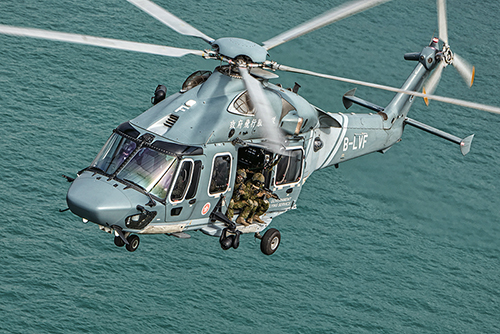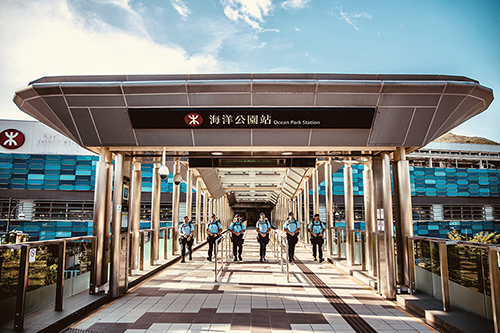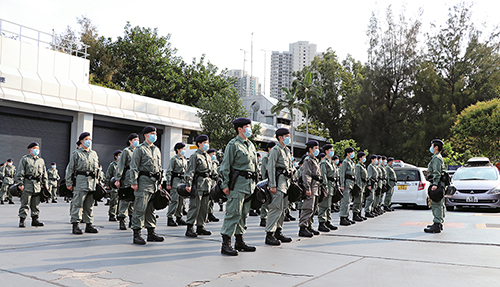Hong Kong Police Review 2021
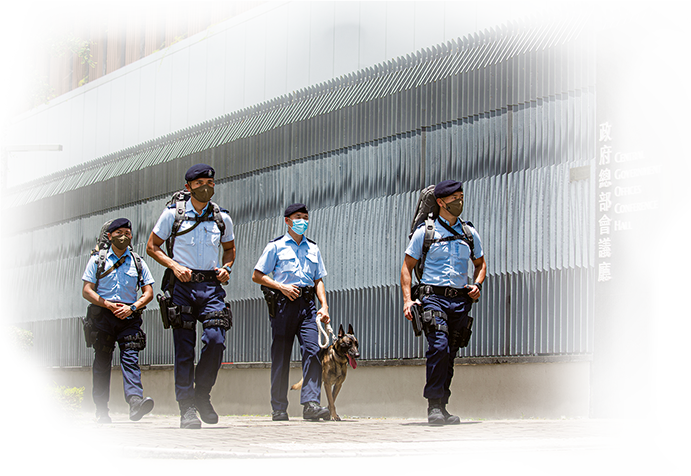
The total number of crimes reported to the Police in 2021 was 64,428, an increase of 1,196 cases (up 1.9%) compared with 2020 (63,232 cases). Violent crimes rose by 196 cases (up 2.1%), from 9,391 to 9,587. Deception was the major factor for the increase (3,696 more cases, up 23.8%) in overall crimes, while other crimes with noticeable spikes included indecent assault (336 more cases, up 49.3%), serious drug offences (421 more cases, up 36.6%), rape (15 more cases, up 23.4%), criminal intimidation (203 more cases, up 14.5%) and blackmail (193 more cases, up 13.8%).
For every 100,000 people, 869 cases were reported, of which 129 were classified as violent crimes, compared with 845 and 126 cases respectively in 2020. Detection rates for overall and violent crimes rose slightly by 0.7 and 4.1 percentage points respectively, mainly attributable to significant increases in the detection rates of robberies, arson and burglaries.
Crimes that recorded decreases included robbery (141 fewer cases, down 53.4%) and burglary (623 fewer cases, down 29.7%). While 2021 registered record low figures for the two types of crimes since these statistics started to be kept in 1969, the year also saw the highest detection rates for both categories (robbery 78%, burglary 34.9%) in the past 45 years. As well, 2021 was the sixth consecutive year in which no robbery cases involved the use of genuine firearms.
Organised Crime and Triads
The Organized Crime and Triad Bureau combats organised and serious crime and triad activities through proactive, intelligence-led operations.
In June and July, the Bureau co-ordinated enforcement action across the Force against bookmaking activities during major football events, resulting in the arrest of 824 persons and the seizure of $23 million in cash and more than $3.6 billion of betting records.
Between June and August, the Bureau mounted Operation THUNDERBOLT 2021 with the Guangdong and Macao Police, leading to the arrest of 2,320 persons and the seizure of crime proceeds worth more than $3.9 billion.
The Bureau also undertook proactive investigation and intelligence gathering during the year to combat organised crimes, including activities related to firearms and smuggling.
Criminal Intelligence
As the intelligence pivot of the Force, the Criminal Intelligence Bureau manages the Force's intelligence system and provides intelligence support for major operations and serious crime investigations. To foster intelligence-led policing across the Force, the Bureau provides professional training, strengthens the intelligence network, streamlines the flow of intelligence and upgrades computer systems on intelligence analysis. The Bureau continues to target triads and sophisticated crime syndicates; and maintains close liaison with designated Mainland, Macao and overseas law enforcement intelligence agencies in the fight against transnational and cross-boundary crimes.
Commercial Crime
The Commercial Crime Bureau investigates complex commercial crimes. In the year, the Bureau detected an insurance fraud relating to Investment-linked Assurance Scheme (ILAS) transactions, which led to regulators undertaking a comprehensive review of the regulation of ILAS product sales.
The Anti-Deception Coordination Centre and the Fraud and Money Laundering Intelligence Taskforce under the Bureau play a pivotal role in disrupting scams, serious financial crime and money laundering threats.
The Centre combats deception and raises public awareness of various kinds of scams. As at December 2021, the Anti-Scam Helpline 18222 received more than 131,900 public enquiry calls and helped intercept $9.87 billion of crime proceeds in 2,844 fraud cases.


The Centre's promotional truck visited 21 police districts, covering 10 primary and secondary schools, to disseminate anti-deception messages.
In 2021, the Centre expanded its round-the-clock contact with eight virtual banks and eight conventional banks to strengthen the Force's capability to help victims recover their losses. Anti-deception messages were delivered to target audiences, including a publicity video alerting investors to 'Ramp and Dump' schemes and a Chinese opera to make senior residents more aware of scams.
The Taskforce, established jointly with the Hong Kong Monetary Authority, Hong Kong Association of Banks and local financial institutions, draws on the expertise and capabilities of the banking industry in the fight against fraud and money laundering. Since its launch in May 2017, the Taskforce has facilitated intelligence exchange in 167 cases, contributed to the arrest of 394 persons in 91 intelligence-led operations and frozen crime proceeds amounting to $749 million. In October, the Taskforce hosted a train-the-trainer workshop for 150 participants from 28 local banks, during which they shared their experiences in deception intervention, the detection of bogus identities and mule account network analysis. With the inclusion of the eight virtual banks in 2021, the Taskforce has progressed towards a more representative public-private partnership and its good standing is well recognised worldwide.
Cyber Security and Technology Crime
The Cyber Security and Technology Crime Bureau combats technology crime and maintains the security of Hong Kong's cyberspace through partnerships with the community as well as local and overseas stakeholders.
The Bureau plays a leading role in the international arena. Its Chief Superintendent serves as Chairman of the INTERPOL Global Cybercrime Expert Group (IGCEG), as appointed in April 2020 by the INTERPOL Secretariat General (IPSG). In July, the Bureau and INTERPOL co-hosted the first virtual Technology Crime Investigation Workshop, and the Chief Superintendent presided over the sixth Annual Meeting of the IGCEG online as the Chairman. He is committed to assisting the IPSG in developing long-term and comprehensive strategies on combating technology crimes and protecting cyber security.
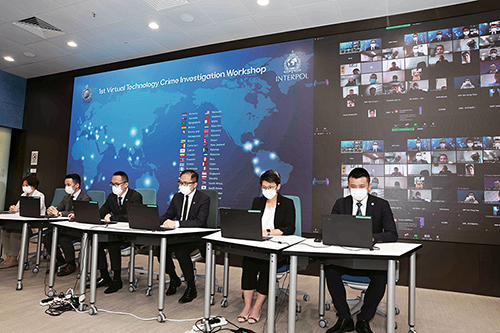
The Cyber Security and Technology Crime Bureau and INTERPOL co-hosted the first virtual Technology Crime Investigation Workshop in July.
Operation-wise, the Bureau strategically cracked down on online doxxing and incitement activities during the pandemic and festive periods. The sources of doxxing were uprooted, causing the number of fresh cases to drop significantly by 93% since August 2020. Coupled with various intelligence-led operations against e-shopping fraud, investment fraud, romance scams, compensated dating scams and the hijacking of stored value facilities, the Bureau detected 262 cases in 2021 involving an aggregate loss of $50.83 million and the arrest of 112 persons.
The Bureau has initiated a variety of skill transfer and upgrading projects to equip frontline officers with the ability to handle digital evidence and technology crimes. It also worked with police regions to establish five self-service digital forensic examination facilities and the New Territories North Digital Forensics Laboratory. The new facilities aim to expedite digital forensic examinations and, by extension, raise the holistic efficiency of case management.
The Cyber Security Centre under the Bureau provides round-the-clock services to help critical infrastructures strengthen their cyber security awareness and response capabilities in major incidents, so as to prevent and address targeted cyber-attack and cyber-terrorism threats. The Bureau collaborates with local and overseas stakeholders to safeguard cyber security and enhance the ability to counter cyber terrorism via transnational cyber hygiene operations, tripartite counter-terrorism exercises and the training of critical infrastructure operators. In terms of public education, the Bureau organised the year-long campaign 'Cyberthon 2021', co-ordinating more than 50 booth activities, 30 online and on-site seminars, and a series of press interviews and competitions. It also launched a one-stop cyber knowledge platform, 'CyberDefender', in August to raise the public's awareness of cyber security and enhance their digital literacy.
Narcotics
The Narcotics Bureau combats drug traffickers and the flow of dangerous drugs into Hong Kong through a multi-agency and community-based approach, and promotes public awareness of drug abuse through partnerships with local and overseas law enforcement agencies and community stakeholders.
Intelligence operations mounted in the year resulted in the arrest of 131 persons and the seizure of 4.9 tonnes of illicit drugs. These operations included the detection of two largest-ever drug-trafficking cases, with the seizure of 706kg of cocaine in April and 1,266kg of ketamine in December.
In June, the Bureau launched a publicity campaign to boost public resilience to drug abuse. Innovative means were adopted, including the provision of a virtual reality experience, a drug scent simulator and a promotional truck. The campaign not only enhanced collaboration between the Police and community stakeholders, but also instilled anti-drug values in the public.
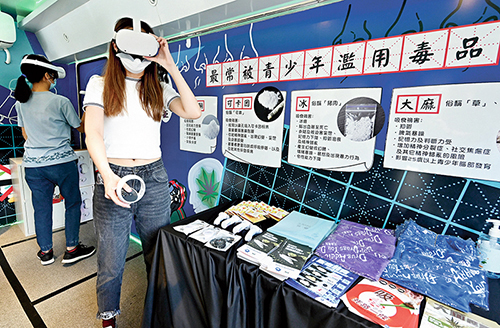

Visitors of the Narcotics Bureau's Anti-Drugs Month in June used virtual reality devices to experience the harmful effects of drug abuse on physical and mental health.
Financial Investigation and Intelligence
In view of the sheer volume and complexity of financial intelligence and investigations, the Financial Investigation Division (FID), Joint Financial Intelligence Unit (JFIU) and Financial Investigation Headquarters (FI HQ) were spun off from the Narcotics Bureau in June, forming the Financial Intelligence and Investigation Bureau (FIIB) to strengthen the Force's anti-money laundering and counter-financing of terrorism (AML/CFT) capabilities.
The FID conducts financial investigations and subsequent asset recovery. In 2021, the concerted efforts of the FID and other investigation units led to the successful prosecution of 125 criminals for money laundering, together with the placement of $209.4 million and $122.9 million under restraint and confiscation orders respectively.
The JFIU works with local and foreign law enforcement agencies as well as private entities to gather and exchange financial intelligence. It processed and analysed more than 56,000 reports of suspicious transactions throughout the year. After the Legislative Council approved the funding in July, the JFIU started developing a Financial Data Analytic Platform to harness advanced technologies such as big data analysis and artificial intelligence to raise the quality of its intelligence output.
The FI HQ co-operates closely with other AML/CFT stakeholders on policy and legislative matters, strategic analysis, and territory-wide risk assessment and training. Their work produced a strategic analysis report, 'Dealers in Precious Stones and Metals', in December. Hong Kong's second territory-wide money laundering and terrorist financing risk assessment exercise continued in 2021, and the report is scheduled to be published in early 2022.
To raise awareness of crimes related to money laundering, the FIIB conducted a one-month programme in 2021 known as Project ACCFENCERS, which comprised an AML slogan competition, proactive enforcement, stakeholder and public engagement events and some publicity activities.
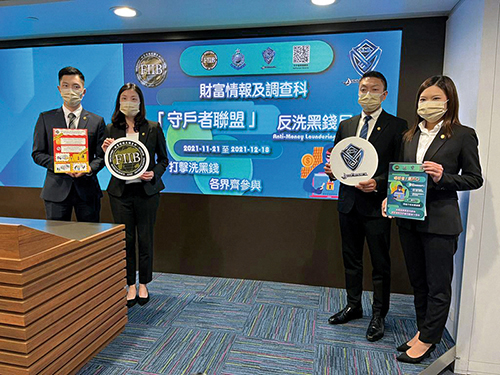

The Financial Intelligence and Investigation Bureau held a press conference to summarise the enforcement action and publicity work of 'Project ACCFENCERS – AML Month', which was launched on November 21.
Liaison
The Liaison Bureau supports uninterrupted communication with stakeholders and strategic partners in the areas of fighting crime and sharing intelligence on criminal activities. It co-ordinates virtual meetings, including high-level exchanges with international strategic partners and working-level conversations to cope with cross-border investigative needs. In the region, the Bureau strives to maintain an effective partnership with Mainland, Macao and foreign authorities. In terms of training, the Bureau works with Mainland authorities and INTERPOL to help different units of the Force learn about the latest crime trends, enhance policing know-how and promote best practice via electronic platforms.
Crime Prevention
The Crime Prevention Bureau raises public awareness of prevalent crimes through a multi-pronged approach in publicity and education, and renders professional advice to different sectors. During 2021, the Bureau, as the Crime Wing's Co-ordinator, launched six campaigns on deception, youth drug abuse, quick cash crimes, child protection and technology crime to garner public support for crime prevention. Virtual reality was used to provide a more interactive platform to engage the younger generation. Apart from crime prevention, the Bureau also provided security advice on critical structures and buildings to fight against the COVID-19 pandemic.
Forensic Support
The Identification Bureau embraces technology to support frontline officers. In 2021, it launched a Case Photo Repository and Secure Camera App to manage case-related photos more efficiently. The Bureau is also enhancing the professionalism of its forensic testing services. Major highlights during the year included receiving the Testing and Certification Manpower Development Corporate Award from the Hong Kong Council for Testing and Certification, and securing accreditation at Qualifications Framework Level 4 for its 'Professional Certificate Programme in Fingerprint Detection Technology'.
Criminal Records
The Criminal Records Bureau provides support 24 hours a day to frontline officers and other government departments in relation to information on the Police Operational Nominal Index Computer System. To enhance operational efficiency, the Bureau is digitalising workflow using technology.
Abusive Offences and Youth Crime
The Family Conflict and Sexual Violence Policy Unit formulates and implements the Force's policies, procedures and training on how to handle child and elderly abuse, domestic and sexual violence, youth crime, and offences involving mentally incapacitated persons. Major highlights in 2021 included the implementation of the Extended Community Support Service Scheme to provide timely counselling and support to offenders under the age of 18 and the launch of a 'Child Protection Campaign', which attracted the participation of more than 60,000 residents and 350 schools and achieved a world record with its Jumping Jacks Video Album.


Mascots from the 'Let's T.A.L.K.' Child Protection Campaign and Hong Kong's disciplined services reinforced the message of child protection by performing a drama on November 27 at the closing ceremony of the campaign, an initiative organised by the Crime Support Group's Family Conflict and Sexual Violence Policy Unit.
Major Incident Investigation and Disaster Support
The Major Incident Investigation and Disaster Support System supports the Government's fight against COVID-19 by helping the Centre for Health Protection of the Department of Health trace contacts and investigate cases. The system has analysed more than 12,000 confirmed COVID-19 cases and their contacts since it was activated under Operation PINETOWER in February 2020.
Frontline officers make use of the Major Incident Investigation and Disaster Support System to analyse COVID-19 cases and their close contacts.
Witness Protection
The Witness Protection Unit runs witness protection programmes. It also provides victims and vulnerable people who are susceptible to serious crimes with safety advice and the assurance of personal well-being.
Explosive Ordnance Disposal
The Explosive Ordnance Disposal Bureau carries out bomb disposal work. In 2021, cases involving homemade improvised explosive devices and conventional munition continued to surface. The Bureau worked to dispose of ammunition and explosives and helped handle cases of intimidating letters enclosed with suspicious substances.
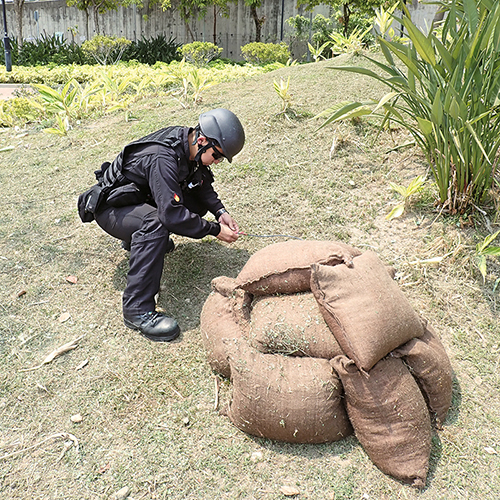
An officer of the Explosive Ordnance Disposal Bureau examined an unexploded bomb at Wu Shan Riverside Park in Tuen Mun in April.
Training at Police Tactical Unit Headquarters
In recent years, the Police have been facing ever-demanding challenges posed by increasingly violent criminal activities and public disorder incidents. The Police Tactical Unit (PTU) is developing the latest tactics in public order policing, anti-crime patrol, internal security and physical fitness to cope with the daily tasks.
Owing to the severity of the COVID-19 situation, the PTU has been deployed to handle compulsory testing duties in areas under the Government's restriction-testing declaration operation and also to the Contact Tracing Offices, assisting in tracing people who have come into close contact with confirmed cases. The PTU Headquarters reviewed its training syllabus to include pandemic-related operational training and the use of technology such as virtual reality training, so as to enhance the capability and confidence of officers in handling public events, major incidents and emergencies.
Counter-terrorism across Departments
The Inter-departmental Counter Terrorism Unit comprises members from the Customs and Excise Department, the Correctional Services Department, the Fire Services Department, the Government Flying Service, the Hong Kong Police Force and the Immigration Department. Headed by a Senior Superintendent of Police, the Unit co-ordinates inter-departmental counter-terrorism efforts and promotes public awareness of countering terrorism.
Counter-terrorism is not only a matter for law enforcement agencies, as public support and participation are also vital. To promote a 'whole-of-community' approach in counter-terrorism, the Unit launched a public education drive with the theme 'Spot and Report' to tell the public how to identify and report suspected terrorism-related people, objects and activities.
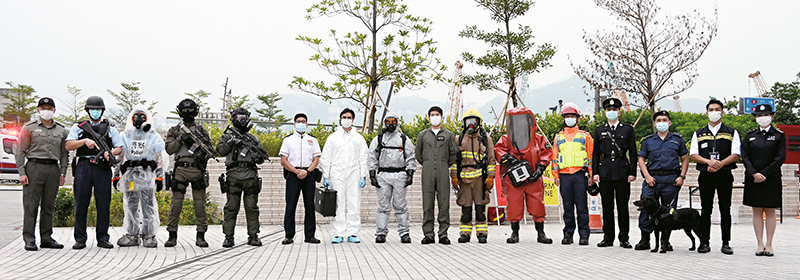
The Inter-departmental Counter Terrorism Unit organised TIGERPACE in November, bringing together more than 300 officers from its six member departments, the Government Laboratory and the MTR Corporation to take part in the exercise.
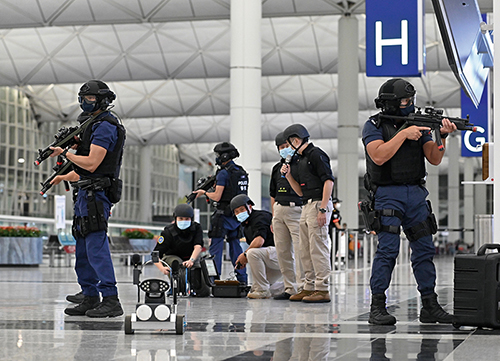
Officers of the Police Negotiation Cadre deployed a robot as a channel of talks with mock terrorists at the Hong Kong International Airport in April, as part of the Operations Wing and the Inter-departmental Counter Terrorism Unit's joint counter-terrorism exercise, IRONWILL.
Special Duties
The Special Duties Unit is the definitive armed tactical intervention unit of the Force. The Unit is capable of conducting land, sea and air operations, and specialises in handling terrorist attacks, hostage taking and armed criminal activities.
Major Incidents
The Major Incidents Bureau oversees the Force's overall strategy and specific policies on the policing of terrorism and major incidents, and audits the Force's preparedness and response capabilities for such incidents. The Bureau comprises five divisions, namely the Counter Terrorism and Internal Security Division, Exercise and Audit Division, Major Events Planning Division, Police Public Engagement Office, and Force Exercise Team.
Counter-terrorism and Internal Security Policies
The Counter Terrorism and Internal Security Division formulates and implements the Force's policies and orders on counter-terrorism and internal security. The Division keeps a close watch on trends in global and domestic terrorism, refines counter-terrorism strategies in a timely manner and formulates the corresponding action plans. It also collaborates with other government departments and private organisations to enhance public vigilance and to educate members of the public about counter-terrorism initiatives. To maintain the highest level of readiness, the Division co-ordinates and conducts realistic counter-terrorism training and exercises based on prevailing trends of terrorism, and constantly reviews, tests and strengthens inter-unit and inter-departmental operability and the Force's overall capability in responding to terrorist incidents.
The Counter Terrorism Response Unit, which operates under the Division, can be strategically deployed to protect critical infrastructure and sensitive premises, and to ensure a rapid and effective response to any potential terrorist activities or incidents necessitating immediate tactical intervention in Hong Kong.
Exercise and Audit
The Exercise and Audit Division is the Force's policy unit responsible for steering and auditing the operational capabilities for policing public events and major incidents, and acts as the secretariat of the Command Cadre. The Division also reviews the policies and operational procedures of Emergency Units, co-ordinates the inter-departmental deployment of Special Constables and explores training and development opportunities for commanding officers.
Major Event Planning and Co-ordination
When the Force formulates operational plans for major events, the Major Events Planning Division performs a co-ordinating role to ensure effective communication among senior management, the relevant formations, organisers and other stakeholders in the public and private sectors. Internally, it provides secretariat services to the Force's Steering Committee and the Police Headquarters Planning and Coordination Team, and co-ordinates among major formations, advising and assisting in the planning process and monitoring progress to ensure the operation planning is in line with the Force's directives. Since March, the Division has been co-ordinating preparations for the policing of the 25th anniversary of the establishment of the HKSAR, to ensure the events will be conducted in a safe, orderly and secure manner.
Public Engagement
The Police Public Engagement Office engages strategically with various stakeholders and organisations so that public events can run smoothly and peacefully. It facilitates communication between frontline officers and organisers for better mutual understanding.
Co-ordination of Counter-terrorism Exercises across the Force
The Force Exercise Team was established in August on a special duty basis to raise the Force's capability in handling terrorist incidents in the run-up to the 25th anniversary of the establishment of the HKSAR. The Team's Charter includes conducting counter-terrorism exercises in police regions and across the Force, as well as tactical training for Emergency Units.
Operations Command and Control
The Operations Bureau oversees the Force's operational matters, liaises with the People's Liberation Army (PLA) Hong Kong Garrison, plans and executes search operations, and develops the future command and control communications system. The Bureau comprises the Operations Division, the PTU Operational Contingents, the Fourth Generation of Command and Control Communications System Special Duties Team, and the Key Points and Search Division, which includes the Police Dog Unit.
Operations Management and Liaison
The Operations Division operates the Headquarters Command and Control Centre round the clock and deals with operational matters including the formulation of orders in the Force, policies concerning boundary security and illegal immigration, allocation of operational resources, and liaison with the PLA Hong Kong Garrison. It also oversees the policing policy of major cross-boundary infrastructures and city development projects.
Since the outbreak of COVID-19, the Division has been the Force's contact point with other government bureaux and departments. The Division plans and co-ordinates the enforcement of anti-pandemic measures and liaises with different bodies regarding immigration control, quarantine arrangements and the co-ordination of restriction-testing declaration and compulsory testing notice operations.
Fourth Generation of Command and Control Communications
The Fourth Generation of Command and Control Communications System Special Duties Team plans and co-ordinates the next-generation Command and Control Communications System.
To improve digital policing capabilities, a mobile application, Beat App, was developed in 2021. With the Beat App, frontline officers can conduct record checks on individuals, vehicles and vessels using smart devices issued by the Force.
The Beat App digitalises traditional stop-and-search duties, streamlines the enquiry process, raises operational efficiency and safety, and shortens the waiting time after an enquiry has been submitted. It also alleviates the workload of the Regional Command and Control Centres so that more resources can be deployed for emergency services.
Search Operations and Key Facility Protection
There are two units under the command of the Key Points and Search Division, namely the Force Search Unit and the Police Dog Unit.
The Force Search Unit formulates strategies and policies on protecting crucial facilities. It ensures the Force is equipped with the latest drone technology to meet the operational challenges. The Unit also performs a secretariat role for the Force Search Cadre, which carries out search and security screening at major events. In 2021, the Unit played an important role in major operations to ensure the safe and orderly conduct of the events.
The Police Dog Unit keeps more than 100 trained dogs for patrolling, drug detection and the searching of arms, ammunition and explosives. To enhance counter-terrorism readiness, the Police Dog Unit Quick Response Team was set up in 2021, with dog handlers and their police dogs strategically deployed with other special units to enhance patrols at critical infrastructure and sensitive premises, and to ensure a rapid and effective response to any potential terrorist activities.
High-level Command
The Command Cadre comprises officers from the ranks of Superintendent to Assistant Commissioner. The Cadre provides the Force with a selected pool of highly trained Field Commanders who are capable of taking charge of significant operational command tasks. Members of the Cadre receive regular training in different fields to ensure their commanding capabilities are maintained at the highest level of readiness.
Professional Support in Scale Modelling
The Briefing Support Unit is an integral part of the Force's counter-terrorism response capabilities. It constructs scale models to support operational planning, post-incident investigations and court proceedings. The Unit consists of 28 officers who serve on a voluntary basis and have received formal training in the interpretation of plans and drawings, model building and 3D modelling.
Special Escort Duties
In 2021, the Force Escort Group recorded 2,952 man-days in 89 mobilisations to provide escort services to the PLA Hong Kong Garrison and to transport arms and ammunition, valuable property, COVID-19 vaccines and prisoners requiring special security measures. The Group also participated in police recruitment activities, including Recruitment Experience and Assessment Day, the Police Mentorship Programme and the Education and Careers Expo.
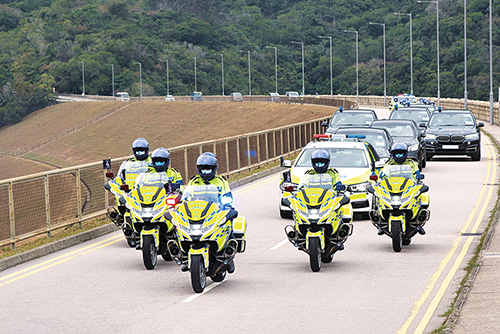
The Force Escort Group chalked up 2,952 man-days in 89 mobilisations to provide escort services during the year.
Rope Access
Under the motto 'Attitude Drives Altitude', the Force Rope Access Cadre renders round-the-clock support to frontline units engaged in policing tasks at unusual locations, and provides professional advice to frontline commanders on policing matters related to working at height. Cadre members receive regular professional training to maintain specialised access capabilities and the highest level of readiness.
Professional Negotiation
The Police Negotiation Cadre consists of 100 members who are on standby 24 hours a day as a secondary duty to their main policing functions. The Cadre is equipped with crisis intervention capabilities and can be deployed to handle terrorist and hostage incidents, to intervene in attempted suicides and to manage negotiations at major public events. All members share the common values of passion, professionalism and commitment, aiming at saving lives and resolving crises.
The Cadre conducts regular negotiation training and joint exercises with key stakeholders within and outside the Force, and takes part in international conferences and training programmes. It organises crisis management and suicide intervention workshops for members of other disciplinary services, the Civil Service College, social workers, mental health professionals, school principals and disciplinary masters.
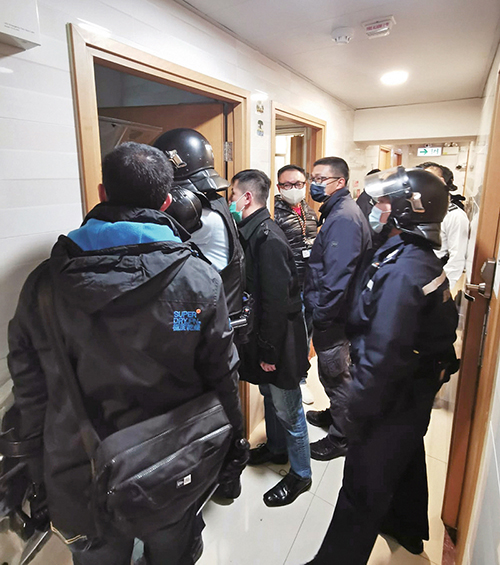
Police Negotiators went to a flat in Tsing Yi to resolve a case of people being locked inside the premises.
TANGO Company
The TANGO Company consists of female officers only. It was initially formed in 1992 to help handle women and children in Vietnamese refugee camps. Nowadays, the TANGO Company is often deployed in public events and security operations to assist in security screening and crowd management. In view of the radical social movement in recent years, specially trained TANGO Company members had also been assigned to handle female protesters in public disorder or riot situations.
Licensing and Registration
The Police Licensing Office issues licences and permits, processes the registration of societies, and implements and reviews licensing policies. In addition, the Office facilitates the work of other licensing authorities and co-ordinates the Force's policy on public order events.
During the COVID-19 pandemic, the Office maintained efficient services to the public. Through enhancing the Hong Kong Police Licensing System, online application services were launched for various licences and permits, such as the Temporary Liquor Licence, Lion Dance Permit and Massage Establishments Licence. These e-services not only brought convenience to the public, but were also effective in reducing social contact as people were no longer required to submit such applications in person.
The Office also helped frontline officers handle public order events by providing policy-related opinions and processing appeals lodged with the Appeal Board on Public Meetings and Processions.
Occupational Safety and Health
The Occupational Safety and Health (OSH) Cadre trains members of the Force on risk assessment, risk management and OSH incident investigation. Its goal is to achieve compliance with the Occupational Safety and Health Ordinance across the Force. In 2021, the Cadre provided training that led to OSH qualifications for 196 people, and gave safety induction training to more than 840 new recruits at the Police College. The Cadre also arranged OSH refresher training for more than 680 members of the Force.
Animal Watchers Programme
To combat crimes against animals, the Police are implementing the Animal Watchers Programme (AWP) proactively to pool together the efforts of animal lovers at the community level and raise awareness of preventing cruelty to animals.
The AWP was launched in February, with AWP Central Advisory Board members, AWP Captains and AWP Watchers appointed to carry out educational and promotional activities in the community.
Other event highlights included the AWP Fight Poisoning Campaign, AWP Plank Challenge and AWP Community Mobile Classroom. Under the support of members of the public and the wide media coverage, the message of loving animals and preventing animal cruelty was promoted successfully to the public.


The costumed mascots representing programme ambassadors Sunny and Zander went round the city on Community Mobile Classroom publicity trucks to spread animal protection messages.
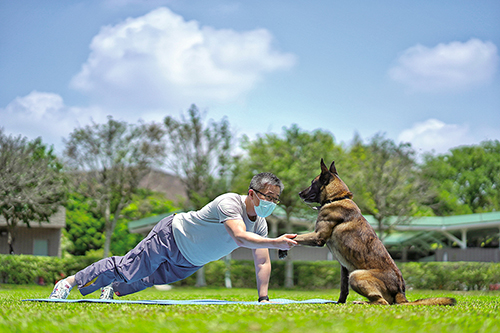
The AWP Plank Challenge invited people to take videos with their pets based on the theme of plank support to show the mutual support between humans and animals.
Public Relations
Over the past year, the Police Public Relations Branch (PPRB) has formulated proactive PR strategies and carried out partnership initiatives with both the media and the wider community to enlist public support for the work of the Force. Police activities and information is shared with the media on a 24-hour basis via the PPRB's interactive electronic platform.
The PPRB communicates with the media and public using the Police Public Page, the Police Mobile Application, the police YouTube channel, the Police Facebook page, the Police Instagram account, and the Police Weibo and Twitter pages to disseminate police messages and rebut rumours in a timely manner. In 2021, around 6,000 posts were published on these platforms, accumulating 1.6 million subscribers, likes and followers. Adding to this internet publicity drive is an online programme, 'OffBeat On Air', which is solely produced by the PPRB and provides a 15-minute episode at 9pm every Thursday on the Force's Facebook and YouTube accounts, advising the audience on the latest crime trends and crime prevention tips.
In order to support frontline officers in handling the media in the increasing number of major operations, the PPRB expanded the manpower of the Force Media Liaison Cadre to over 300, which contributed a total attendance of more than 2,000 on the ground in 2021.
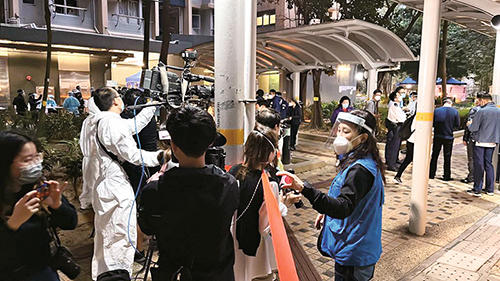
A member of the Force Media Liaison Cadre helped frontline officers co-ordinate media coverage in a restricted area.
In addition, the PPRB organised media-related training for more than 3,500 officers from different units, including spokesperson training at the rank of Chief Inspector or above and media-handling sharing sessions for frontline officers, to strengthen colleagues' ability to interact with journalists. The 16-year-old Police Media Briefing Room was refurbished to improve its facilities and provide better services to the media.
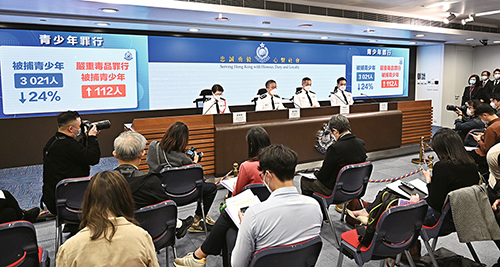
The revamped Media Briefing Room has a 10 meter by 1.5 meter frameless high-definition digital wall to display high-quality photos and videos during press conferences.
The PPRB also revamped the biweekly OffBeat from a staff magazine to a public engagement tool that is circulated online to members of the media and the public. Three thematic issues of the OffBeat Special Edition were published to further introduce police work and project a professional image of the Force.
More work went into publicising the Force's professionalism and raising public awareness of abiding by the law through PPRB collaborations with local news agencies to broadcast or publish more than 100 feature articles covering the themes 'Police Serving the Public with Dedication', 'Police Expert Series', 'Stories of Good Citizen Awardees' and other policing-related or crime prevention topics. To recognise the efforts of frontline officers and evoke their initial aspirations of joining the Police, the PPRB also worked with a local television broadcaster to produce a six-episode TV series, 'On a Mission', based on true stories about public compliments of the Force's work, attracting more than 6.5 million viewers. The stories were included in the OffBeat Special Edition – On a Mission to maximise exposure both within and outside the Force.
Buoyed by the popularity of the Force's promotional video 'Guarding Our City', collectibles including photo books, posters, postcards, gift box sets and desk calendars were produced to project a professional image of the Force and enlist public support.

The Police Public Relations Branch created photo books, gift box sets, desk calendars and postcards as part of souvenirs spawned by the success of the professionally produced video 'Guarding Our City'.
Community Engagement
In 2021, the PPRB strengthened ties with the community and received the support of community leaders, principals, teachers and stakeholders. Through the Junior Police Call (JPC) Scheme, young people are trained to become future leaders with positive values. A new strategy, IDEAS@JPC, was introduced to enhance the learning experience of the JPC. It covers five core areas: innovation, discipline, exposure, adventure and synergy. To meet the needs of young people, the PPRB has successively launched new projects, including the JPC App, the 'STEM-Up HK Innovation and Technology Competition', 'Visit of the Tokyo Olympic Games Mainland Olympians – A Day with the Junior Police Call' and law abidance training packages. The Senior Police Call (SPC) Scheme, covering 22 police districts with a total of more than 13,200 members, promotes crime prevention and personal safety messages to the elderly and takes care of their needs and well-being.
Keeping in mind a public-centric approach, the PPRB adopts professional and innovative thinking to promote publicity projects that will resonate with the public. During the year, the Good Citizen Award Scheme was successfully revamped to enhance public awareness of law abidance. At the same time, police mascots such as the anti-deception ambassador 'The Little Grape', the JPC's 'Mini Bean' and the SPC's 'Master Bean' were introduced to promote interactions with people from different sectors of the community.
To encourage the community to put aside differences, not be misled by unfounded information, and join hands with the Force to build Hong Kong's future, the Police held an exhibition entitled 'United We Stand' at the Hong Kong Cultural Centre and Yuen Long Theatre in July and November respectively, recording more than 8,000 visitors. The Chief Executive, Mrs Carrie Lam, and the Secretary for Security, Mr Tang Ping-keung, were present to show their support.
The Force's Working Group on Community Engagement spearheads initiatives across the Force to interact with members of the public, putting special emphasis on engaging with youths using a soft approach. In mid-2021, the Working Group helped the Law Society of Hong Kong hold the 10th 'Teen Talk' programme by organising eight visits to Force formations, including the Police Dog Unit, Police Tactical Unit and crime bureaux, for hundreds of students, parents and legal professionals.
Other major highlights include half-yearly meetings with the chairpersons of the Associations of Heads of Secondary Schools and Federations of Parent-teacher Associations of all the 18 districts. In March, the Working Group held its third such meeting in the Kowloon East Regional Headquarters, where all the school heads and association representatives visited the New Generation Report Room in Ngau Tau Kok Division. Then in December, the fourth half-yearly meeting was held in the Auxiliary Police Headquarters, giving the guests insights into the recruitment process and training of officers of the Auxiliary Police.
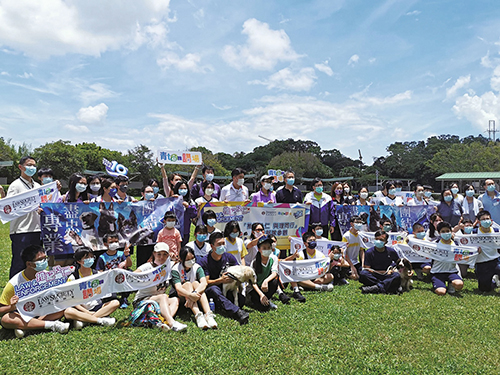
Hundreds of students, parents and legal professionals took part in 'Teen Talk' to visit various Force formations.
Road Safety
In 2021, the number of accidents involving fatalities and serious injuries decreased by 90 to 1,918 (down 4%). The number of fatal traffic accidents decreased by two cases to 94 (down 2%), which was the lowest number since 1954. The Police will continue to work with the community to support the vision, 'Zero Accidents on the Road, Hong Kong's Goal'.

The Traffic Branch Headquarters introduced a new road safety mascot, 'Traffic Bear', in February to engage with the community and disseminate road safety messages.
Frontline Auxiliary Support
The Hong Kong Auxiliary Police Force (HKAPF) is a well-trained reserve team that supports frontline policing duties of the regular force. It maintains an establishment of 4,501 members. In the financial year 2020-2021, a total of 284 new recruits were taken on strength, the most in the last five years. To commensurate with operational needs, the average number of members deployed per day increased to around 700 in 2020-2021 compared with about 560 in 2019-2020.
On December 11, the HKAPF conducted its first Chinese-style flag-raising ceremony at a passing-out parade, which was held to a high standard and in a solemn manner. The ceremony instilled a sense of pride amongst Auxiliary members and fostered affinity with the Motherland.
